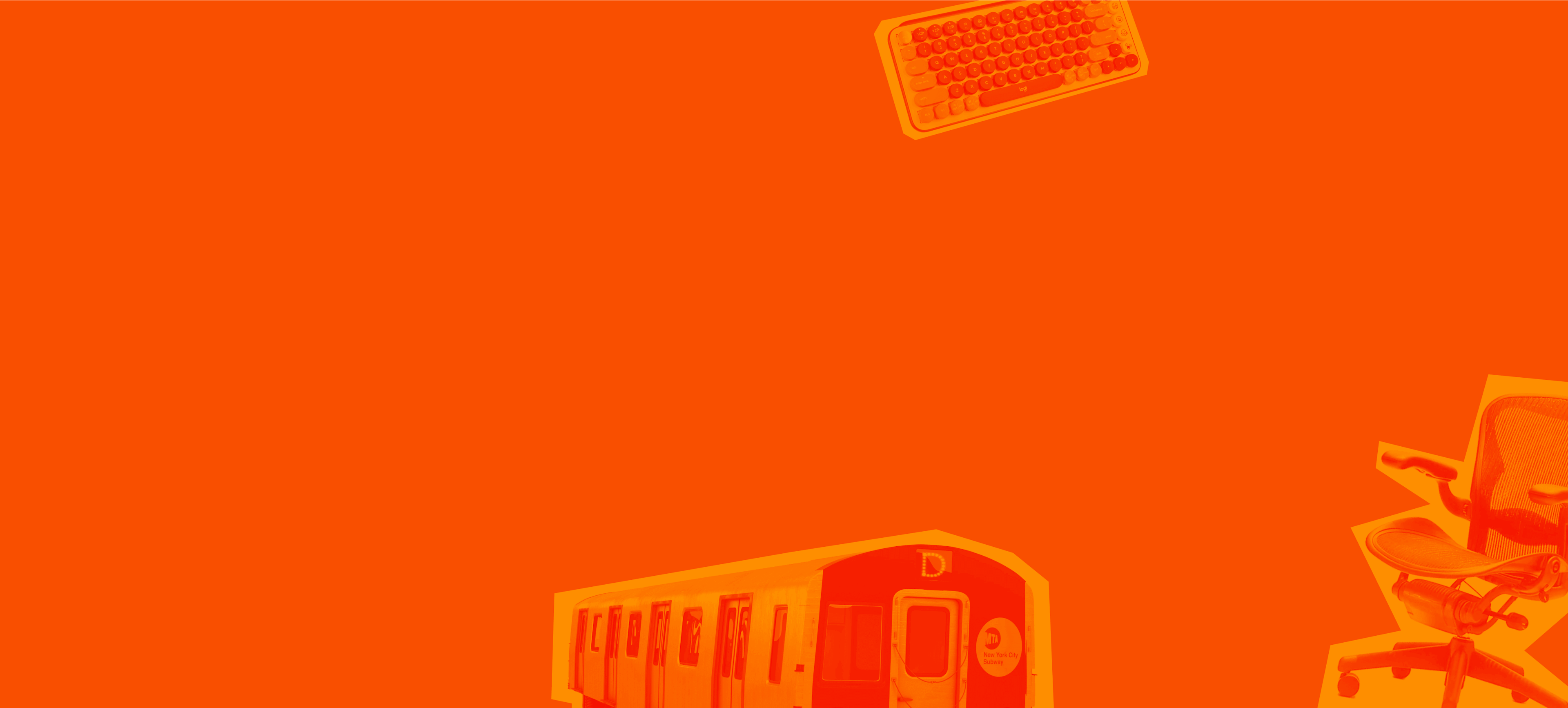
Gen Z brings new expectations to the workplace
The next generation embraces a practical point of view on employer benefits, flexibility, and company values.

Gen Z is entering the workforce with a unique set of priorities. They’re less focused on short-term perks, and more interested in whether an employer is willing to invest in their long-term well-being. They want flexibility without sacrificing in-person community. And they value action and authenticity over a polished corporate image.
To win with this generation, employers will need to find ways to show them—honestly and directly—how they stack up against these expectations. Our research reveals four key takeaways to keep in mind:
01
Retirement benefits are a top priority for Gen Z.
65% of undergrads wouldn’t accept a job that didn’t include retirement benefits such as a company-administered 401(k).
02
Skill-building is core to Gen Z’s definition of success.
63% of undergrads say developing advanced skills in their field is essential to feeling successful in their career.
03
Gen Z sees flexibility as the new standard.
Although many undergrads want to work in person at least some of the time, 82% think remote work should be an option, and 70% would be more likely to apply to a job with a flexible schedule.
04
Values alignment matters, but corporate activism is optional.
65% of undergrads wouldn’t apply to a job if the employer’s values didn’t align with theirs, but only 43% expect employers to take a public stance on social issues.
Early-career benefits at a glance
The benefits employers offer are generally well-aligned with those Gen Z considers most important, with one exception: almost 1 in 4 undergrads say it’s essential their employer offer student loan repayment support, but only 1 in 10 full-time jobs provide this benefit.
Retirement benefits
Retirement benefits are a top priority
Although most of today’s undergrads say they expect to work full time into their sixties, many are already worrying about their eventual retirement prospects. This generation has seen their parents’ retirement plans disrupted by a financial crisis and a pandemic, and they’re facing economic instability along with heavy student loan debt—all of which makes retirement planning feel like a priority. The majority of undergrads on Handshake say being able to retire on time is essential to their definition of career success, and many believe it’s important employers help them reach that goal.
“My dad will not be able to retire until he is 75, and he has extensively planned for his retirement. If it will take him until 75 to retire, then it will most definitely take me longer since I have student loans. If I want to retire younger I think I will have to work two jobs.”
Class of 2024 student
Despite being decades away, retirement is already a real concern for Gen Z
More than half of current undergrads say being able to retire on time—whatever that means to them—is essential to their definition of career success. Given that, it’s not surprising that more than 40% have thought at least a fair amount about planning for retirement, and 15% say it’s a major area of focus. Only 17% report that retirement isn’t on their mind at all.
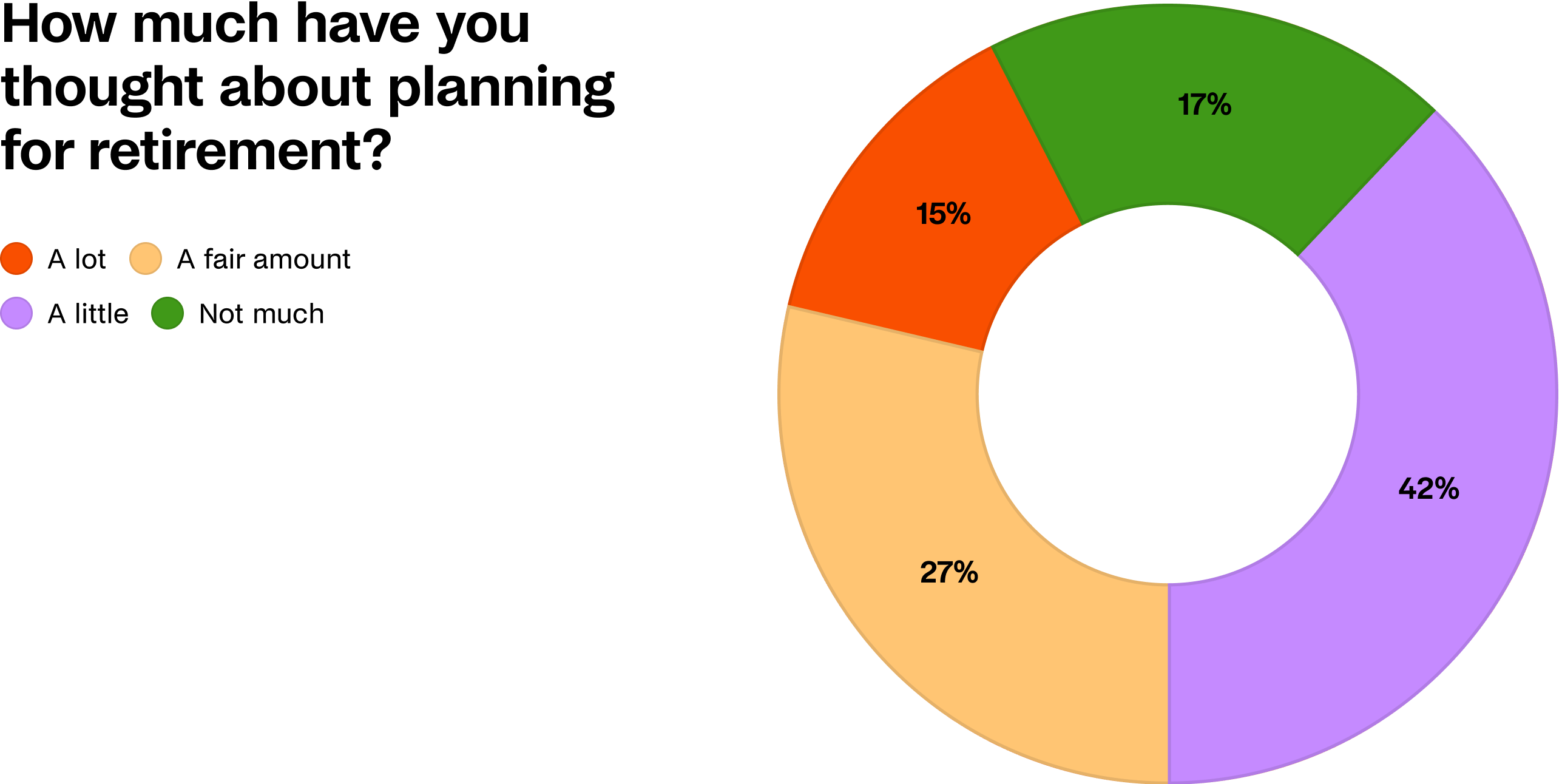
“Planning ahead for retirement is important to me because the earlier you start, the better off you will be in the long run. I hope to work for a company that has a good retirement plan.”
Class of 2025 student
A majority of Gen Z students expect to support older relatives
More than half of current undergrads are either already providing financial support for older family members (such as parents or grandparents) or expect to do so in the future, and students of color are especially likely to be in this position.

“Although my parents have not explicitly told me they expect me to support them, I think it is a given considering I am their only close family in the state. As far as I know, they do not have retirement plans set up and just plan to work for the rest of their lives, and I don't want that future for them.”
Class of 2025 student
Gen Z is looking to employers to help them lay a foundation for retirement
Almost two thirds of undergrads on Handshake say retirement benefits such as an employer-sponsored 401(k) are essential for them, in that they wouldn’t accept a job that didn’t offer this type of support. An additional third say that while retirement benefits may not be essential, they are important and would be a significant factor in their decision to accept a job offer.
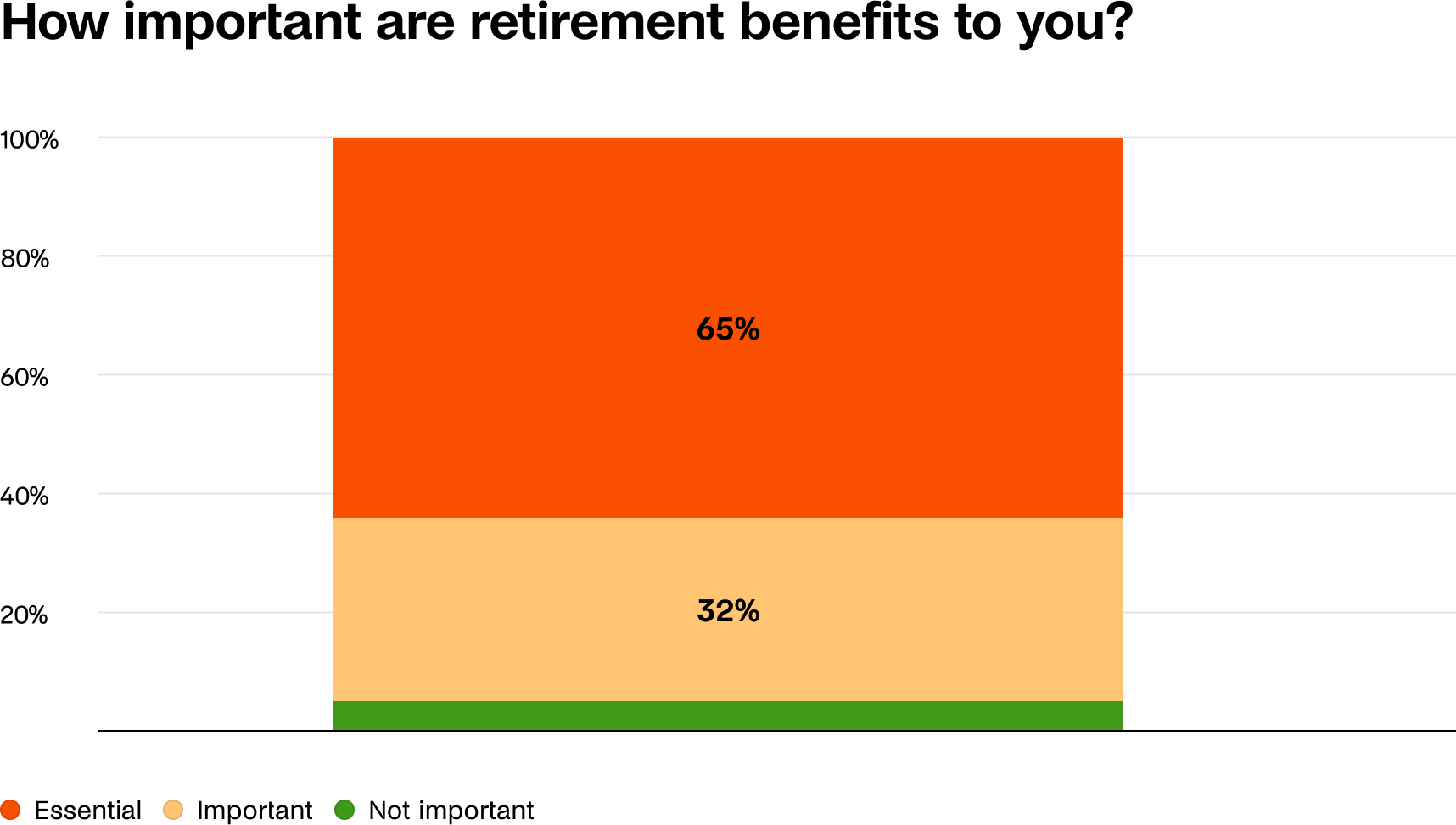
Gen Z thinks both employers and universities should offer financial literacy training
Gen Z believes both employers and universities have a responsibility to help educate young professionals on topics like budgeting, taxes, and retirement planning. 75% of undergrads say employers should provide financial literacy programs, and 89% say the same of universities.
“Financial literacy courses would be so helpful! I have so much trouble grasping all the ins and outs of economics and anything money-related. I would feel so much more confident stepping out into the “adult world” beyond college if this was a service provided to me.”
Class of 2025 student
Skill building
Skill building is core to career success
Gen Z has made it clear they want to keep growing their skills throughout their careers. And while the majority of today’s undergrads say they would accept a job that didn’t offer learning and development benefits, those benefits can set preferred employers apart—particularly in the case of role-specific training, tuition reimbursement, and dedicated PTO.
“Regardless of how difficult formal education has been for me, I still really enjoy learning. Having employer-provided learning and development benefits sounds like the dream.”
Class of 2025 student
Gen Z wants to hone their craft
Almost two thirds of undergrads on Handshake say developing advanced skills in their field is essential to their definition of career success—significantly more than say the same of earning a high salary or advancing to a senior-level role.
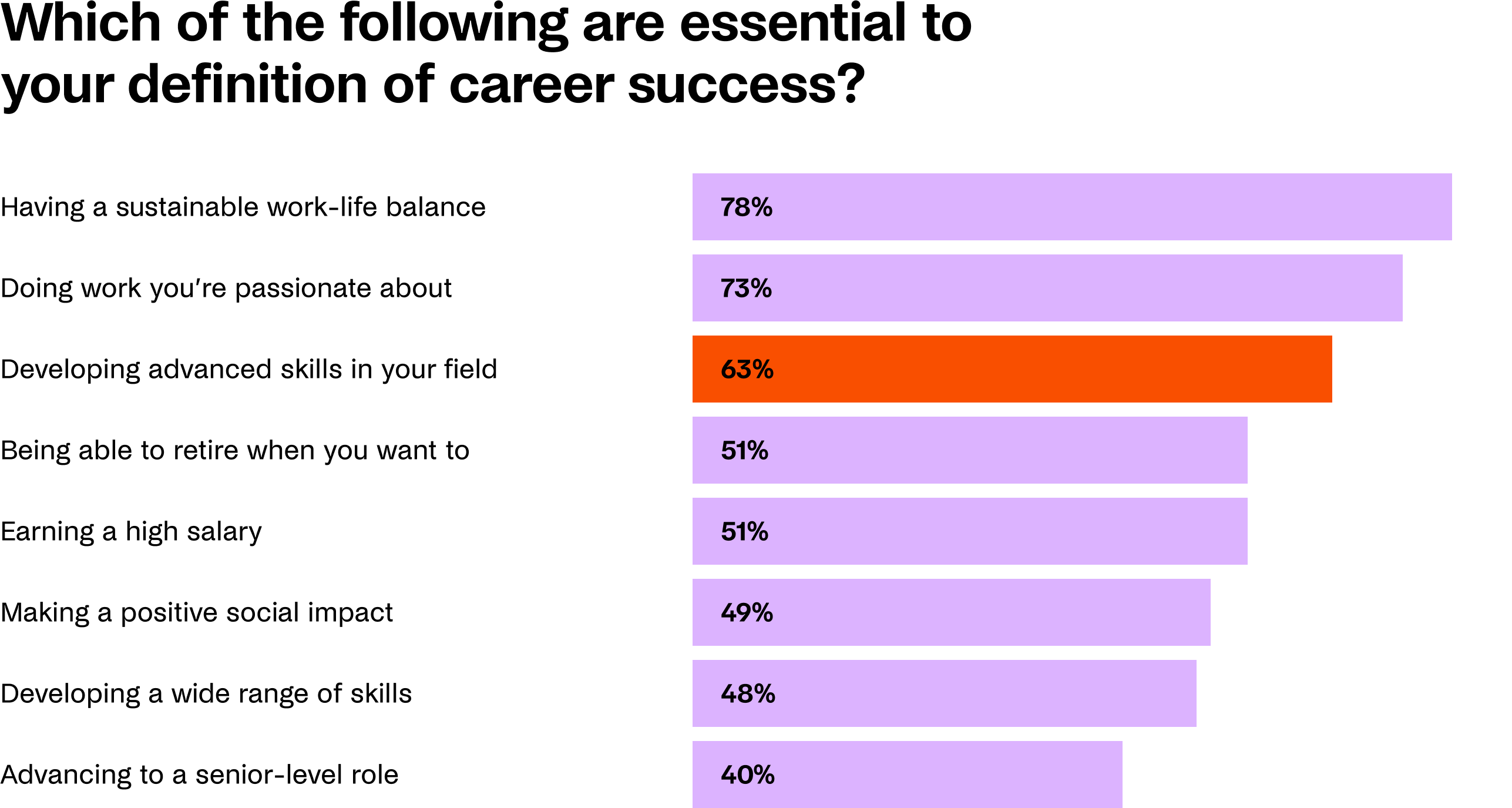
Learning and development (L&D) benefits can be a key differentiator for employers
Gen Z will accept a job without L&D benefits, but they’d prefer to work for an employer that supports their growth. Almost 9 in 10 undergrads say these benefits are either important or essential when evaluating a job opportunity.
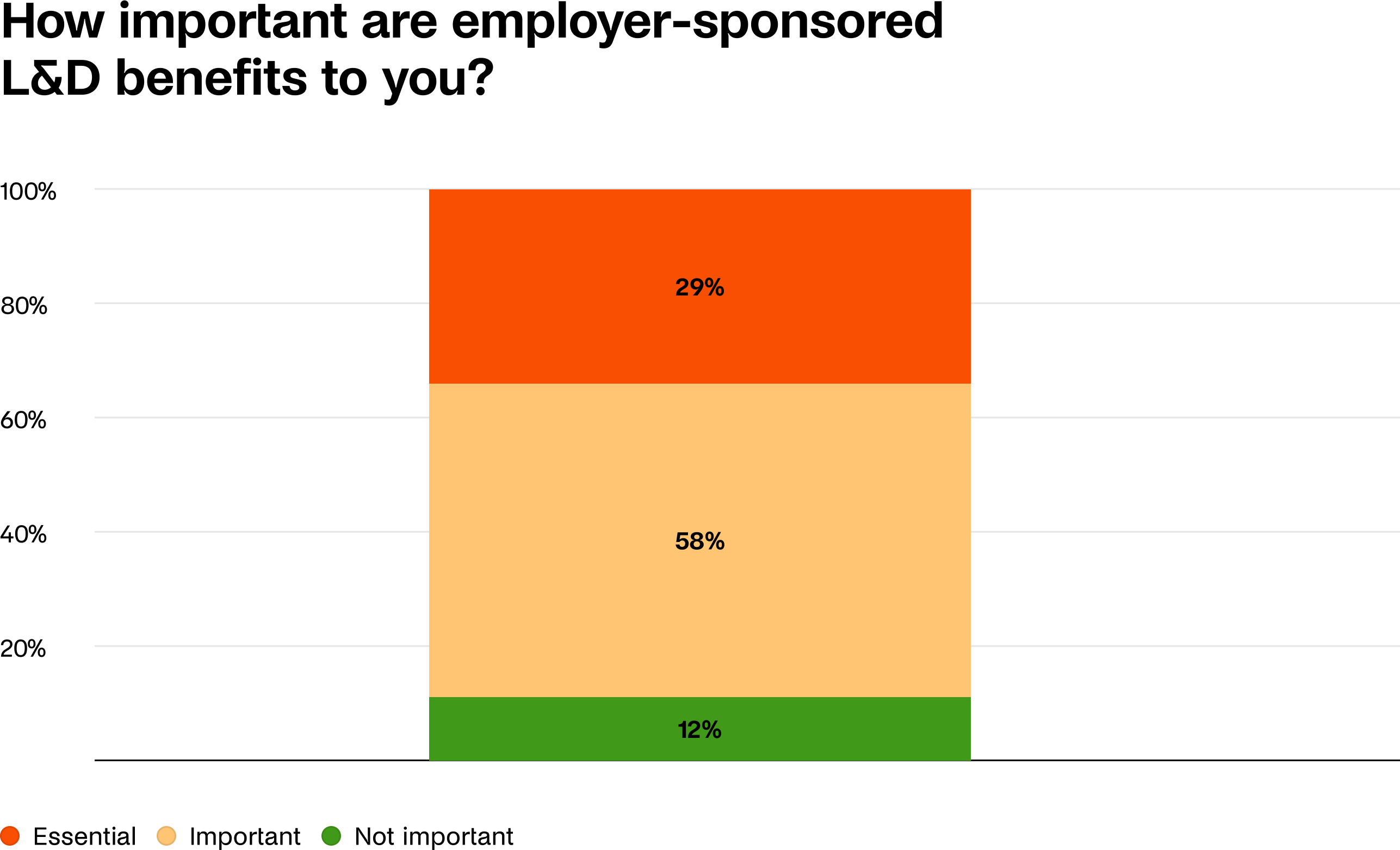
Role-specific training is Gen Z’s preferred L&D benefit
A majority of undergrads on Handshake say role-specific training is a “very valuable” benefit, and about half say the same of tuition reimbursement and dedicated time off to learn. In contrast, only about a third say mentorship programs, learning stipends, and general workplace skills courses are very valuable.
Flexibility
Gen Z sees flexibility as the new standard
For Gen Z, COVID-19 proved a more flexible workplace can work. After witnessing a model in which employees can choose to work where and when they’re most productive, this generation doesn’t want to see a return to pre-pandemic norms. Although they often prefer in-person work, they want remote work to remain an option. They view schedule flexibility as a differentiating benefit that sets employers of choice apart. For many, a sustainable work-life balance goes hand-in-hand with a successful career—one in which they structure their own time for maximum impact.
Gen Z is rejecting the remote vs. in person binary
It’s increasingly clear that Gen Z values time in the office. But it’s also clear they don’t want to be stuck there. 82% of undergrads on Handshake say employees should be able to work remotely at least some of the time. When asked to rank their own work arrangement preferences, current undergrads are least likely to rank fully in-person work first, and most likely to rank fully-remote work last. More than 75% of students say in-person work, with the option to work remotely as needed, is either their first or second choice.
“I would much rather be around people, but have the option to be
virtual if I would like to switch it up. The ability to be flexible
and avoid stagnation is essential to me.”
Class of 2025 student
“I think that the social interaction that comes with working in
person is very valuable, but if remote options are available, I
think workers should be able to choose between being remote and
being in person.”
Class of 2025 student

“After the pandemic I realized there are huge inefficiencies involved in workplaces that are not flexible. I find a hard-line approach to the on-site/remote discussion to be a major red flag these days. I don't mind coming in every day if it makes sense, but in some positions there is just no need for it.”
Class of 2025 student
Remote jobs are declining, but a significant share of new jobs are hybrid
The share of jobs on Handshake that offer fully-remote work has declined significantly over the past two years, from a high of 7.7% of jobs created in December 2021 to just 3.4% of those created in December 2023. But hybrid jobs remain common—more than 15% of new full-time jobs posted in the last quarter of 2023 were open to hybrid work arrangements.
Flexibility sets employers apart
Only 37% of current undergrads say flexible work options, including flexible schedules and a flexible mix of remote and in-person work, are essential to them. But that doesn’t mean flexibility doesn’t impact Gen Z’s job choices. In addition to those who say it’s essential, more than half say flexibility is important and would factor into their decision to accept a job. And 70% say they would be more likely to apply to a job with a flexible schedule.
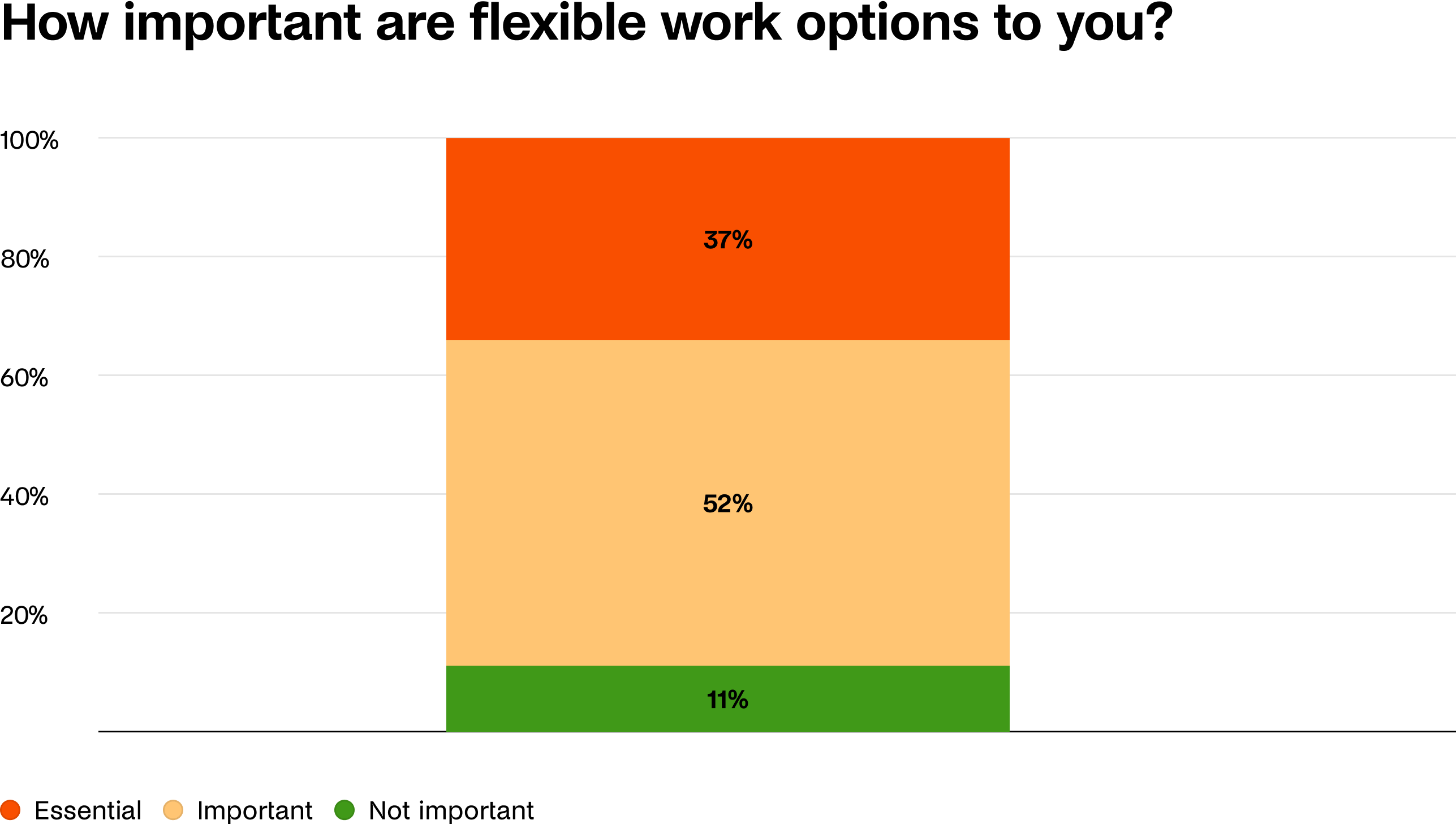
“I tend to work better on my own schedule. I believe more flexibility can lead to heightened productivity in a team if everyone is able to accomplish tasks in a way that works best for them.”
Class of 2025 student
Work-life balance is essential to Gen Z’s definition of career success
Today’s undergrads believe they shouldn’t have to choose between work-life balance and a successful career. In fact, for the vast majority, these two things go hand-in-hand. Nearly 80% of undergrads say achieving a sustainable work-life balance is essential to their definition of career success, compared to only 50% who say the same of earning a high salary, and just 40% who say it’s essential to advance to a senior-level role.
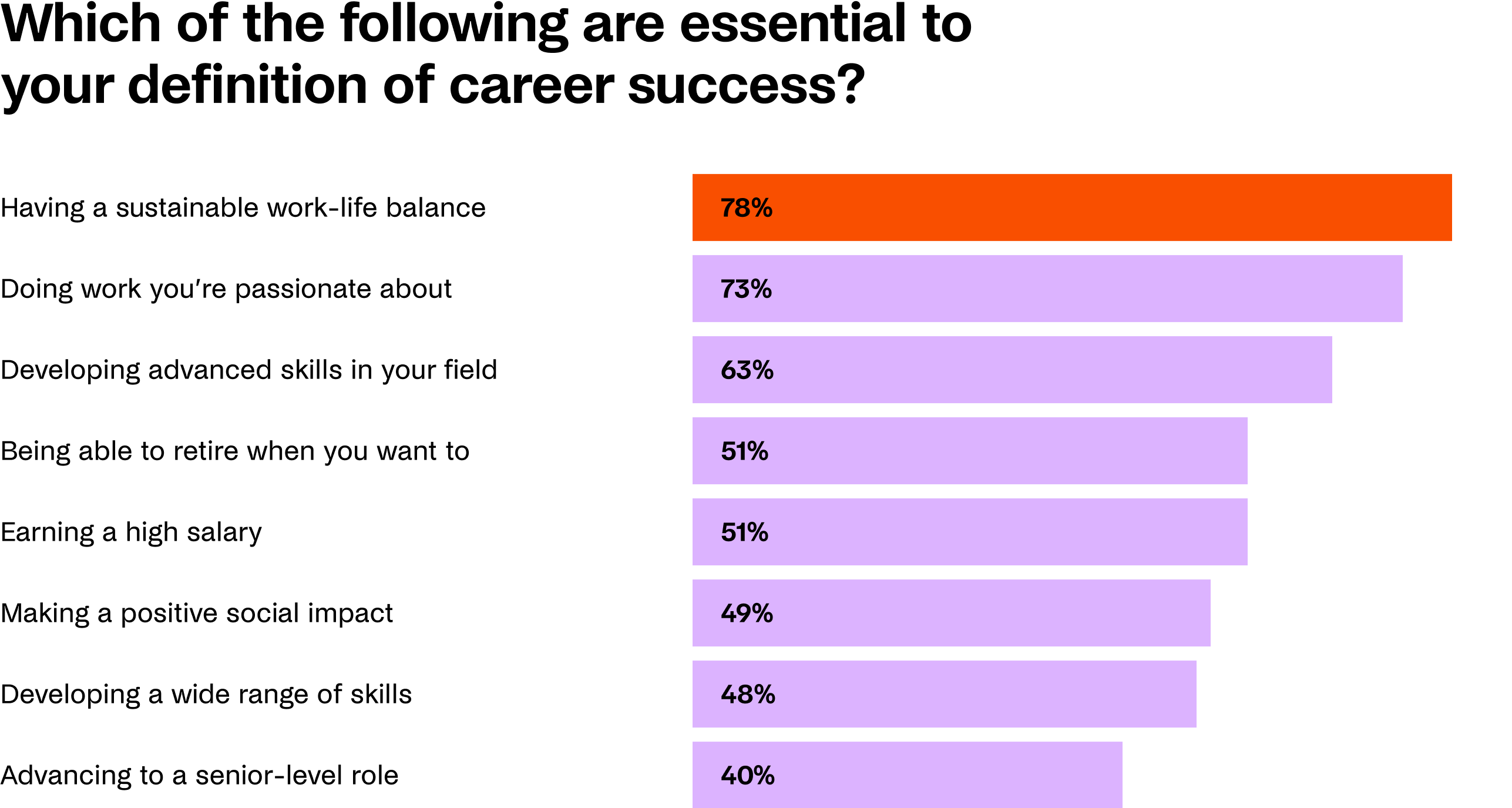
“A good company has reasonable deadlines for projects and I'll be able to go home at the end of the day and switch off.”
Class of 2025 student
“I think work-life balance is very important. Work is important for supporting oneself financially, and if it’s meaningful, that’s great as well. But I believe it is so important to prioritize family and relationships beyond the workplace.”
Class of 2025 student
Values alignment
Values alignment matters, but corporate activism is optional
Doing meaningful work is deeply important to Gen Z, and this generation is committed to making a positive impact on society. However, today’s undergrads don’t necessarily expect employers to champion every cause they care about. While the majority wouldn’t apply to a job if the employer didn’t share their core values, and most would prefer to work for an employer that supports social impact initiatives, far fewer expect their employer to take a public stand on environmental, social, and governance issues. Instead, they hope employers will acknowledge major issues and events internally, especially those that have a direct impact on employees’ lives.
“I want my future company to be involved in issues that matter to the world. I wouldn't want to support a company that didn't align with my values on caring for people and the environment.”
Class of 2024 student
“I would love for the company I work for to align with all of my personal values, but understand that could be an unreasonable expectation. If the important values are in line, I can feel good about it.”
Class of 2024 student
Gen Z wants to work for employers that share their values
About two thirds of undergrads on Handshake wouldn’t apply to a job if the employer’s values felt misaligned with their own, and more than 70% say it’s at least moderately important their employer has committed to making a positive impact on environmental, social, and governance issues.
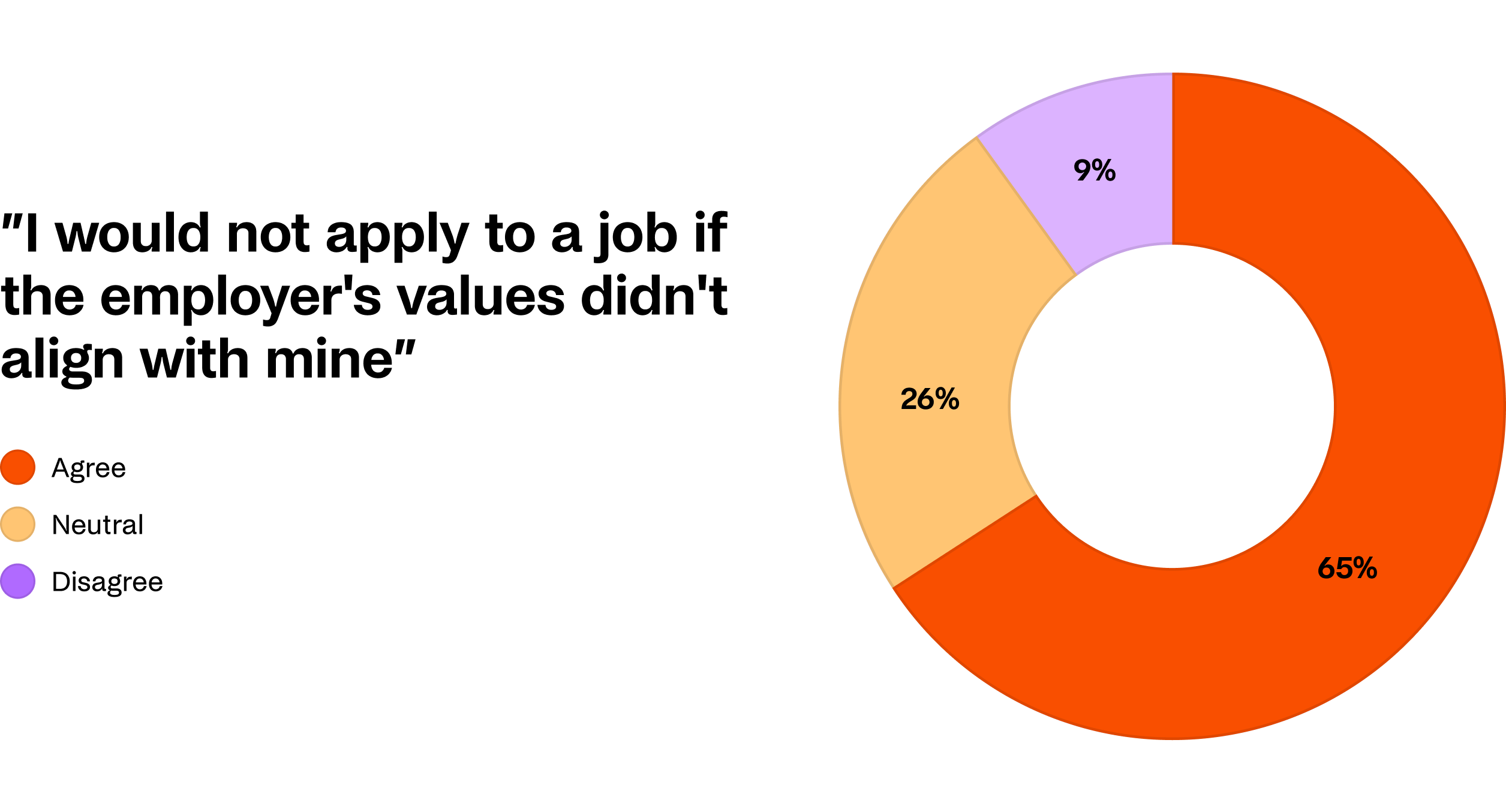
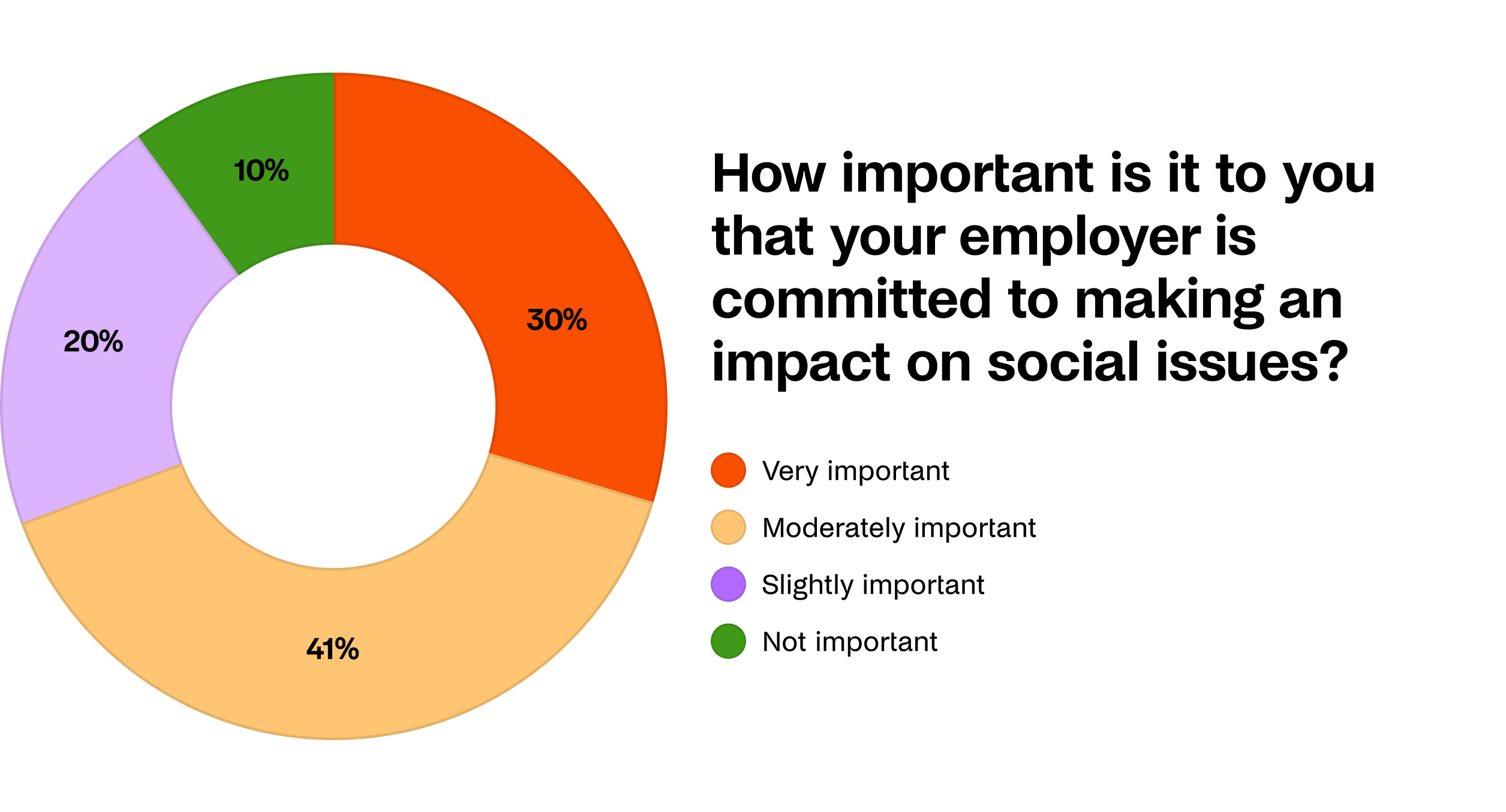
Many job descriptions mention DEI, but fewer speak to environmental, community, and governance issues
The share of job descriptions on Handshake that mention diversity, equity, and inclusion has almost doubled since 2019, to nearly 1 in 5 jobs. But far fewer employers mention commitment to environmental and community impact, or to responsible corporate governance.
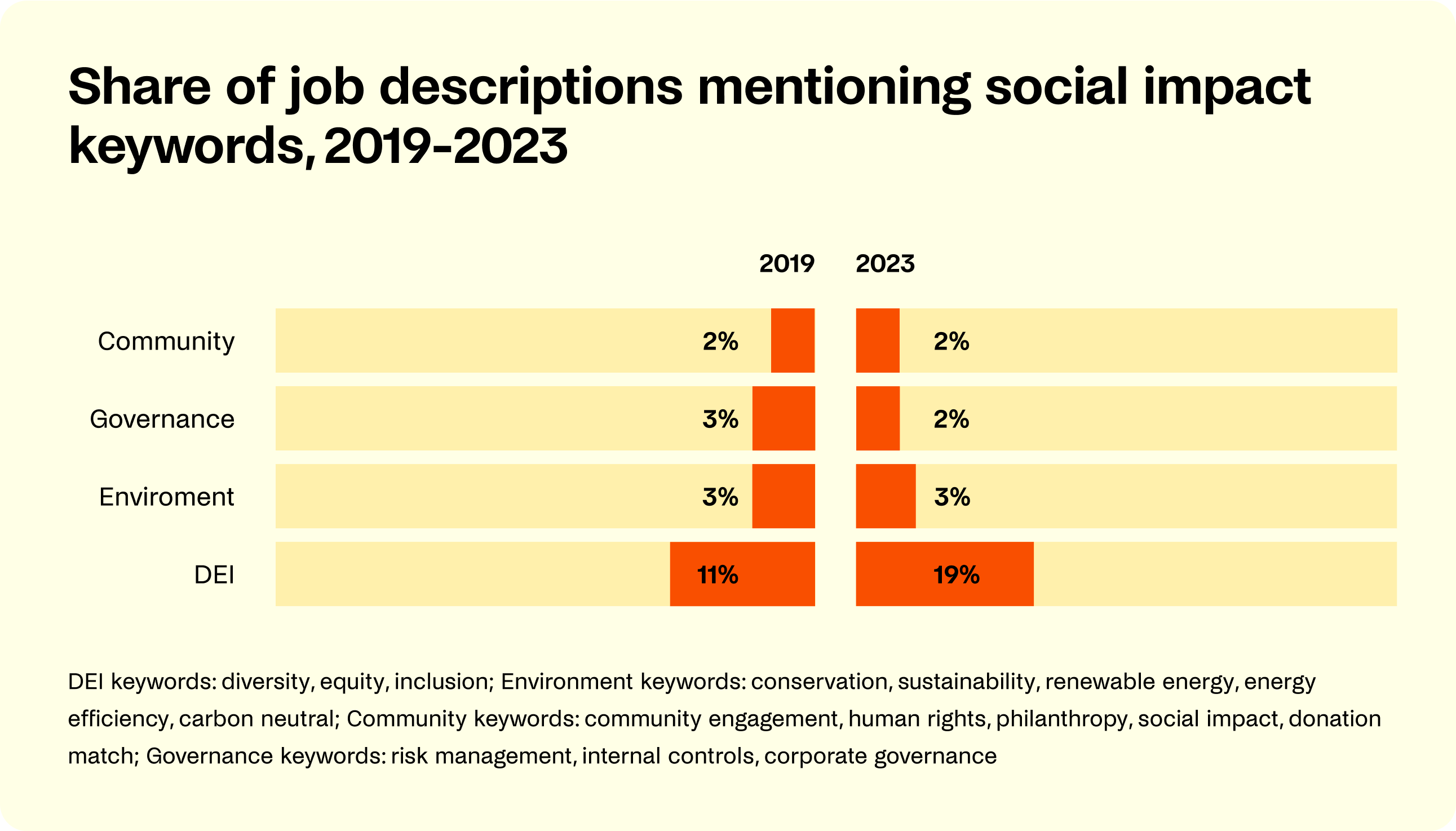 DEI keywords: diversity, equity, inclusion; Environment keywords: conservation, sustainability, renewable energy, energy efficiency, carbon neutral; Community keywords: community engagement, human rights, philanthropy, social impact, donation match; Governance keywords: risk management, internal controls, corporate governance
DEI keywords: diversity, equity, inclusion; Environment keywords: conservation, sustainability, renewable energy, energy efficiency, carbon neutral; Community keywords: community engagement, human rights, philanthropy, social impact, donation match; Governance keywords: risk management, internal controls, corporate governanceWhen it comes to social issues, actions speak louder than words
Less than half of undergrads expect employers to take a public stand on environmental, social, and governance issues. But a majority believe employers should acknowledge issues that impact employees’ lives, even if only internally. About the same share say they’d prefer to work for an employer that takes concrete action (e.g., making donations or adjusting corporate practices) to support the social causes they care about.
“I can perfectly understand why a business would be reticent to make a public statement. There are many altruistic reasons to choose to say nothing. Doing nothing, however, is a different matter. As a business, there is absolutely no excuse to not reinvest in the community that produced you.”
Class of 2025 student
“I do not necessarily think that employers have to talk much about social and political issues, but if there is an issue that is directly affecting many employees I think it is important for an employer to make their stance known and support their employees.”
Class of 2025 student
Meaningful work matters deeply to Gen Z
Almost 3 in 4 undergrads on Handshake say doing work they’re passionate about is essential to their definition of career success, and close to half say the same of making a positive impact on society.
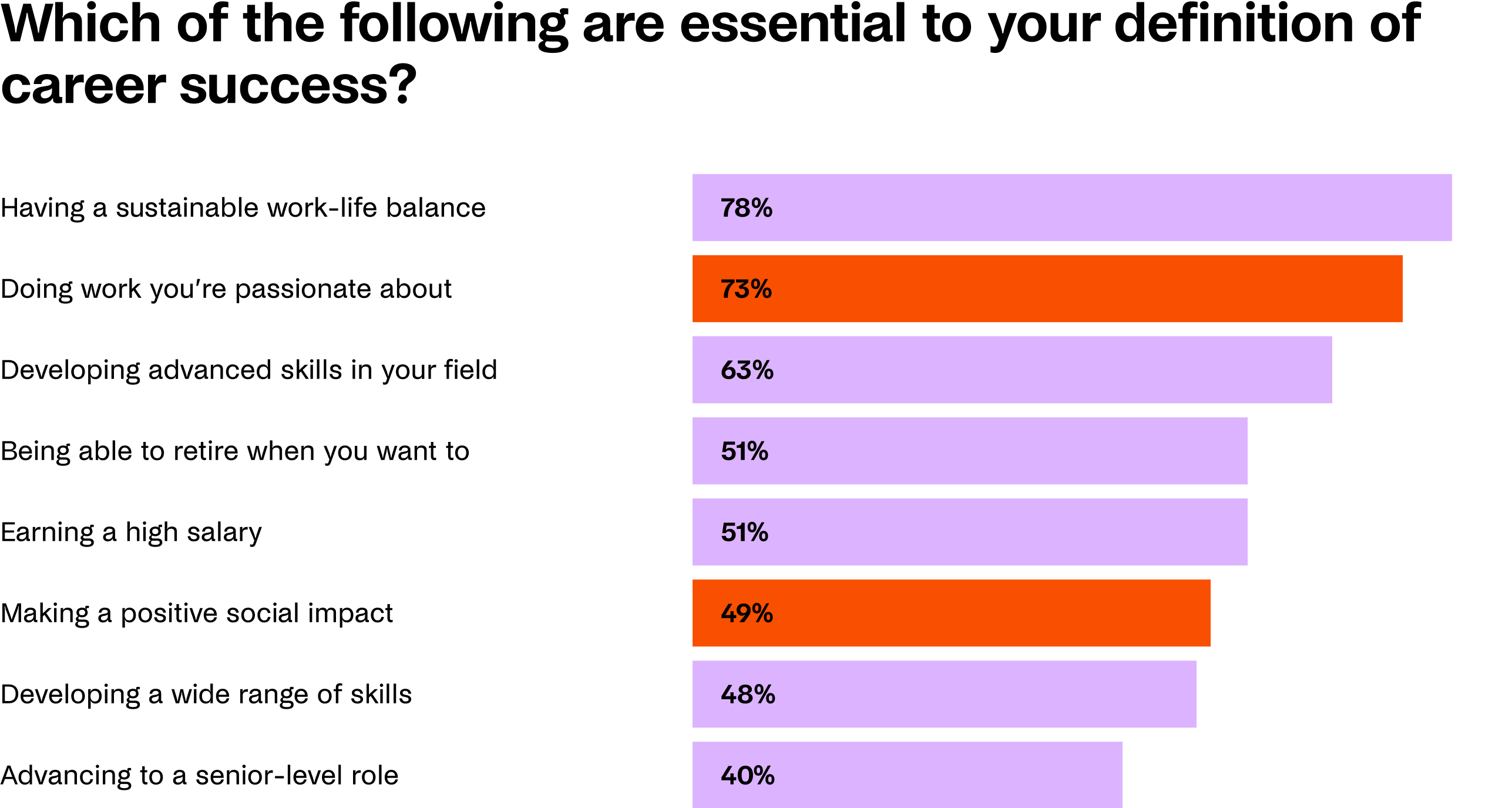
Conclusion
Gen Z is ushering in a new era
As Gen Z enters the workforce in ever-increasing numbers, workplaces are undergoing a dramatic demographic and cultural shift. This generation’s priorities are a unique mix of old and new—they’re craving stability and a secure future, but they’re also eager to evolve their skills, and they want employers to embrace flexible work and commit to social responsibility. To win with Gen Z, companies will need to align both their brands and their actions with these new values and expectations. Those that do will become employers of choice for this generation.

Methodology
Student sentiment surveys
Between December 5-31, 2023, Handshake randomly invited students across the platform to participate in an online survey. After cleaning, 2,518 students pursuing bachelor’s degrees from 601 institutions completed the survey.
Survey weighting
In order to provide a more representative snapshot of student sentiment across four-year college students in the US, survey responses were weighted by gender, race and ethnicity, and selectivity using institutional enrollment numbers from federal NCES datasets.
Platform data
To identify trends in benefits and work modalities, Handshake analyzed data submitted by employers when creating full-time jobs. For benefits, an overall proportion was calculated by dividing the number jobs with a given benefit by the number of jobs with at least one associated benefit.
For ESG, social impact, and DEI trends, Handshake identified job descriptions containing unique keywords related to the topic of interest in order to track change over time.



